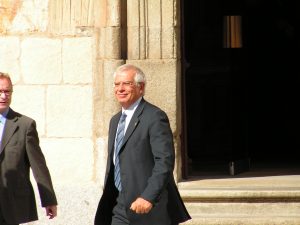EU Condemns Netanyahu Promise to Build Settlement Homes in West Bank’s E1 Area

Israel faced harsh international criticism on Friday 28 Feb, 2020 after it advanced plans for the construction of 3,500 housing units in the contentious E1 area, located adjacent to and northeast of East Jerusalem and to the west of Al-Eizariya area, which is nowadays known as Israel Ma’ale Adumim settlement by the European foreign policy chief Josep Borrell.
European Union (EU) High Representative Josep Borrell responded to the Prime Minister of Israel Benjamin Netanyahu‘s construction plan, after Netanyahu announced last Tuesday that he had ordered the promotion of a plan for 3,500 homes.
Netanyahu pledged to turn Jabal Abu Ghneim (also known as Har Homa) into a “mid-sized city” with emboldened by US President Donald Trump‘s support and his controversial Middle East plan.
The E1 construction plan involves building hundreds of illegal settlement units to link the nearby settlements of Kfar Adumim and Maale Adumim with East Jerusalem in the Israeli-controlled Area C of the West Bank.
The plan will also cut the geographic and territorial contiguity between East-Jerusalem and the West Bank; the results would effectively split the West Bank in half and it aims to cut Palestinian residents off from the rest of the occupied West Bank as it is the only land corridor connecting the northern and southern West Bank.
Also, it would separate East Jerusalem from Palestinians in the occupied West Bank. Building within the area has previously sparked a world outcry, which has sometimes reigned in Netanyahu’s settlement-building sprees, but Netanyahu generally continued in the face of fierce international opposition.
Prior to the EU statement was condemnation by eight European ambassadors from Germany, France, Spain, Italy, Ireland, the Netherlands, Sweden, and the United Kingdom, who “stated their grave concerns about announcements of the Israeli authorities regarding new settlement units in the occupied West Bank & East-Jerusalem, particularly in E1 area, Givat HaMatos & Har Homa.”
The EU statement by the High Representative Josep Borrell declared that:
“The EU reiterates its call on Israel to halt settlement construction, to suspend the publication of tenders and to refrain from any measures aimed at the advancement of such construction plans. Settlements are illegal under international law.”
“We call on both parties to engage in a dialogue and to refrain from any unilateral action that undermines the viability of the two-state solution.”
Netanyahu made the plan to build new settler homes as a bid to secure electoral support from West Bank settlers and to step up settlement activity in the run-up to the country’s third parliamentary election in 12 months, since he faces both a tight general election and a corruption trial.
The hidden intention of the plan is to build new settlement homes in a contentious area but Netanyahu claims that he is building up Jerusalem; moreover, it will deal a devastating blow to the Palestinian dream of independence.
“We are building up Jerusalem and its outskirts,” Netanyahu told a largely right-wing crowd at the annual Besheva conference in Jerusalem.
The Palestinian Authority Foreign Minister Riyad al-Malki said on Wednesday,
“The planned construction would destroy the prospect of a two-state solution.”
The plan to build 3,500 new homes in an area known as E1 “Is so dangerous, more dangerous than any other settlement plans in the West Bank,” Al-Maliki told reporters on the sidelines of the Human Rights Council in Geneva.
All settlements are illegal under international law and will remain a substantial obstacle to peace, and Netanyahu’s behavior will undermine the viability of the two-state solution.
Al-Maliki says the plan “intends to destroy the two-state solution and would kill any possibility for a peace plan proposed by US President Donald Trump and accepted by Israeli Prime Minister Benjamin Netanyahu last month.”
Netanyahu also announced last week that he had lifted restrictions on the construction of the controversial Givat Hamatos neighborhood in East Jerusalem, saying that
“Three-thousand homes would be built for Jewish residents in Givat Hamatos, in addition to another 2,200 housing units for Jews in the nearby Har Homa neighborhood.”
The EU statement follows condemnation by eight European ambassadors from Germany, France, Spain, Italy, Ireland, the Netherlands, Sweden, and the United Kingdom, who “stated their grave concerns about announcements of the Israeli authorities regarding new settlement units in the occupied West Bank & East-Jerusalem, particularly in E1 area, Givat HaMatos & Har Homa.”
*
Note to readers: please click the share buttons above or below. Forward this article to your email lists. Crosspost on your blog site, internet forums. etc.
Muhamed Munir Abu Nahl is a journalist and translator from Palestine. He is currently a graduate student at Tezpur University in India.
Featured image is from Shutterstock


